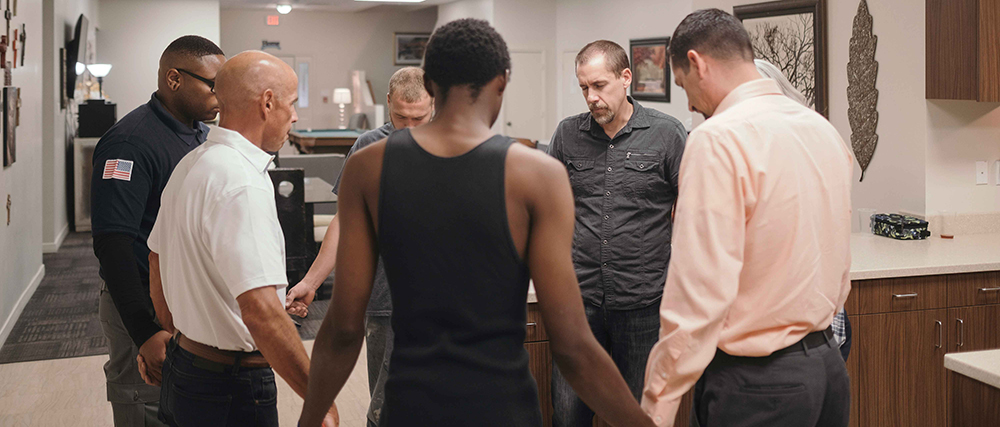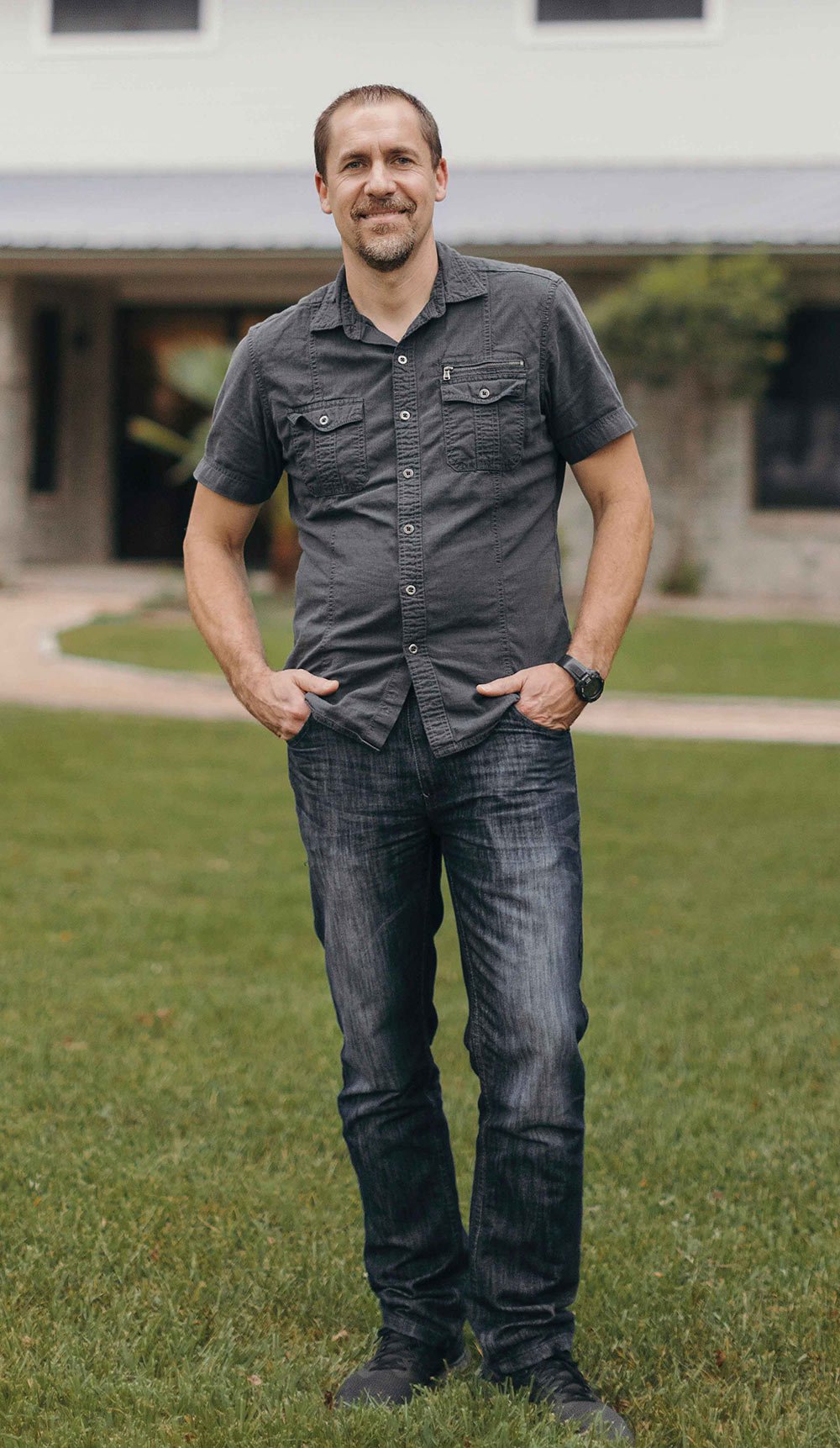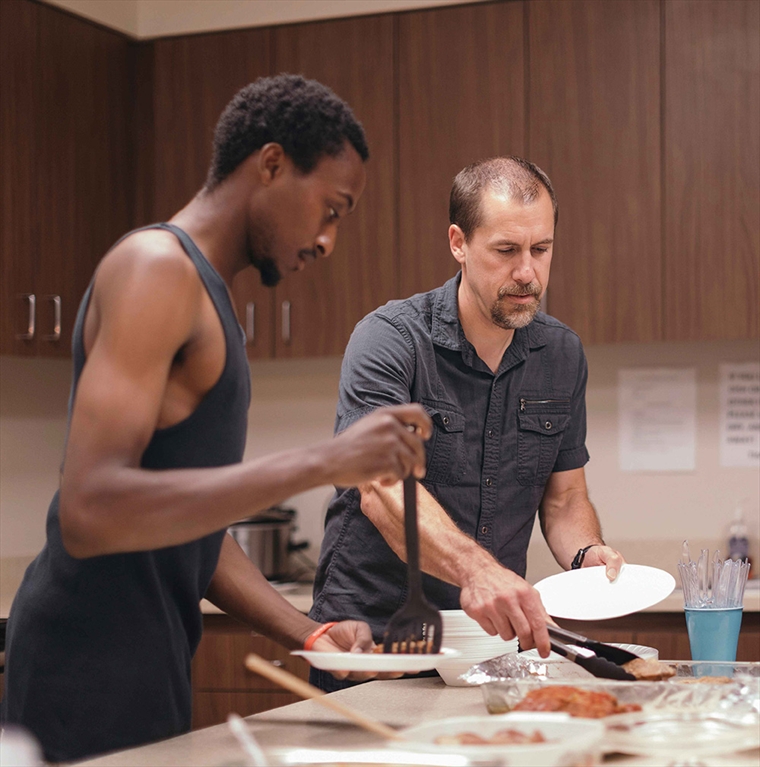A House Full of Hope
By: Brian Hudgins | Categories: Alumni Achievements

“Many of those young men have been in foster care since age 5 or 6,” says Brian Dunn, IE 98, Hope’s Path co-founder and president of the board of directors. “A lot of them try to save any remaining family relationships they can. Frequently, they are trying to go back to their hometowns or wherever to connect with a mom or an uncle. At this point in their lives, a void as big as the Grand Canyon stares out at them.”
The outcome, unfortunately, usually does not include a family reunion. “They are often left alone to try and live their lives,” Dunn says. “A lot of these kids end up victims of human trafficking, homeless, addicted to drugs and incarcerated.”
According to a 2016 National Youth in Transition Database survey, 26 percent of 21-year-olds who had aged out of foster care reported experiencing homelessness during the last two years. Twenty-five percent of those 21-year-olds reported they did not have Medicaid or some other health insurance.
“At Hope’s Path, we are trying to get them on a sustainable, vocational path,” Dunn says. “Working on soft skills is one of the things unique about us. There are other programs that focus on life skills like balancing checkbooks. But those interpersonal relationships are so important. What does it mean to work as a team?”
For many of the young men who come to the Hope’s Path, they’ve been referred by a social worker, child protective services worker or staffer at a Houston homeless shelter. Program participants then go through an application and interview process. Once they’ve been accepted, they are given the title of intern. It is a verbal first step on that path-to-work journey, Dunn says.
Dunn and others recognized from the start that the most important aspect of getting these young men on the right track was providing a house for them—one that offers a striking difference from the temporary shelters they are accustomed to. The 10,000 square-foot, two-story home on an acre lot features multiple bedrooms, a kitchen, deck area and work spaces that give them a truly homey environment where they feel safe and cared for.
“Going from shelter to shelter is nothing but Band-Aids,” Dunn says. “It doesn’t give them hope. We want to show them what a real home and a real workplace looks like. They too often don’t have any idea.”
At the home, the staff—which includes house mothers—provide daily guidance on life skills and Christian teachings,

but everyone is also given space to do their own thing. “The young men are assigned mentors and organically they build real, lasting relationships,” Dunn says. “These guys used to have no one looking out for them, but here they have their own public relations team, their own personal board of directors.“
Chris Younts, 25, has been an intern at Hope’s Path for the past 18 months. He previously worked for a glass company before taking the step of obtaining a graduation certificate as a heating and air conditioning technician. Younts started an apprenticeship with a company in Conroe, Texas, this August.
“I have grown spiritually by being involved in groups and being part of a community here,” Younts says. “Your mentors see you through the programs and help you look for a place to live. But mentors don’t do things for you. They show you how to do it.”
Progress shows up in various steps—it might be holding a job and stringing together multiple paychecks. It can include paying for a car repair. And sometimes it’s gaining the knowledge that you are not only able to help yourself, but also other people. “Hopefully I can use the knowledge and skills that I have learned to assist someone in need,” Younts says. “Like someone who doesn’t have the money or skill to have their AC system repaired.”
Jeremy Branch, 23, is another intern who has been with Hope’s Path since December. He is working toward earning his GED and is pursuing employment opportunities simultaneously. “This is teaching me to be a better man,” Branch says. “They’re helping me learn to pursue goals without skipping steps.”
The doors to opening Hope’s Path could never have opened if Dunn hadn’t embarked on his own personal journey of learning.
Dunn lives in nearby Woodlands, Texas, where he works as a community pastor at StoneBridge Church. His transition from earning a degree in industrial engineering to becoming a member of the clergy was a short one. After “getting out” of Tech, he earned a master of divinity degree from Southwestern Baptist Theological Seminary.
“I went to working for a church straight out of Georgia Tech,” says Dunn, who long has been driven by his Christian faith. While his church work was a given, he never thought he’d be a driving force behind an organization like Hope’s Path.

After having two biological children, Brian and his wife, Whitney, decided to adopt a 3-year-old boy from China. The adoption process led Dunn to discover the plight of orphans abroad—and in their own backyard in Texas. Dunn found out about a gathering of church, nonprofit and child protective services leaders who were looking for better ways to help kids in dire need. Within those meetings, Dunn focused on a specific problem: the jarring reality for children who age out of foster care.
Getting a full grasp of the issue was a process for Dunn. “I may have been guilty of thinking it was a governmental
problem or it’s a child protective services problem,” Dunn says. “But it’s a societal problem. I talked to a staff member at a local prison. He said they calculate the number of cells they need based on the number of foster kids who are set to age out of the system.”
So Dunn decided to do something about it right in his own backyard.
In 2014, he and four other co-founders started to work together to create Hope’s Path. They found, purchased and renovated a home through backing from community businesses, churches, individual volunteers and donors. Office space, conference rooms, a kitchen and an apartment suite for house parents became ingredients in the space that can handle about a dozen young adults or so at a time. Hope’s Path officially opened in December of 2016.
Along with Dunn, executive director Terri Jaggers is one of the original visionaries behind the organization. A clinical assistant professor at Sam Houston State University, Jaggers is a former foster kid herself. Aside from the job skills that many long-term foster care kids lack, she has noticed they have often fallen behind in other crucial areas.
“These young men don’t even know what they like,” Jaggers says. “Do they like milk? Everything has been parceled out to them and they have received only what was given to them. They lose their ability to express their opinions and dream.”
Jaggers knows all of this first-hand. “I went into foster care when I was 4 years old and I was expected to be a statistic in foster care. I was determined not to give up. I didn’t stop dreaming.”
She says Dunn has played a variety of crucial roles at Hope’s Path: adviser, problem solver and business coordinator.
“Brian is the glue that holds all of us together,” Jaggers says. “He has a calming and deliberate sense of purpose. He coordinates the business and faith-based communities. Industrial engineers have that sense of detail. Hope’s Path requires so many diverse people.”


